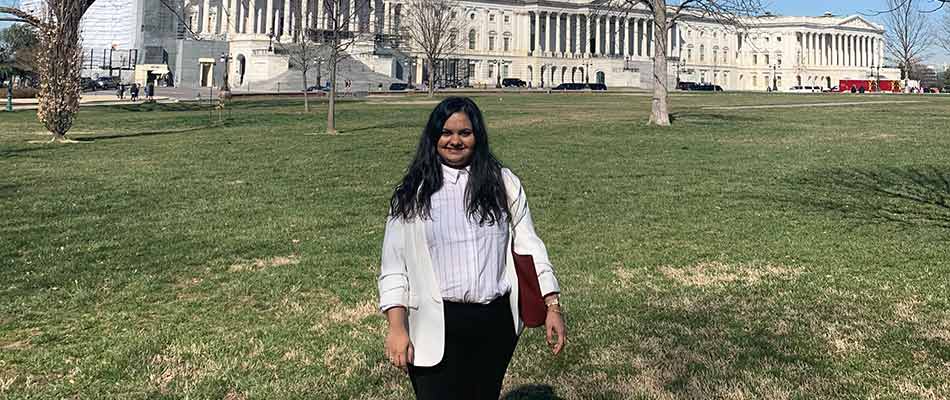Higher education in India has evolved tremendously over the years, but it is still almost unthinkable for a board topper to choose a career path that moves away from medicine or engineering. Ashini Patel, after school, made her decision and consistently moved away from stereotypes. She pursued her interests with a Major in Economics and a Minor in Literature and Cultural Studies at FLAME, with its dynamic course structure, she says, it proved to be a transformative decision.
After a couple of professional stints, she is currently pursuing MA in International Affairs with a specialization in Global Economic Affairs at the Frederick S. Pardee School of Global Studies, Boston University. She also interned with the United Nations, New York, in the Department of Global Communications. 'One thing I have learned through my experiences is that it is never a good idea to put boundaries on education. As idealistic as this may seem, the truth is that the world has never looked for one-dimensional personalities, and nothing should force you to fit into a particular box,’ she says displaying her abundant spirit. Here’s Ashini ‘unboxed’, full of surprises and with the promise of an exciting future.
As a board topper, you opted for Humanities rather than Science or Commerce. Was that seen as a rebellion of sorts?
Not really. I was just sure that I didn’t want to study Science or Commerce. I had grown up reading History and Literature and I did not want to let go of Math, which I love. My teachers were supportive but worried about switching the normative Humanities subject of Psychology with Math. My father was also not sure, and there was an overarching uncertainty looming over my future. But it settled down gradually after they began understanding my interest areas.
From there to FLAME, how did you come around to making that decision?
While choosing undergraduate programs, I was looking at options abroad. I had applied to foreign universities for an Economics major. But after getting accepted, I realized that I would have to quit History and Literature. Thankfully, I discovered FLAME’s Liberal Education program where I could pursue all my interests under one program. There was some initial skepticism about it being a new college, but I was confident of my choice. Looking back now, it was the best decision I made.
You have called your time at FLAME a transformative experience. Why is that?
When I joined FLAME, the only confusion in my mind was whether to pick Economics or Literature and Cultural Studies as my Major. That was later an easy decision because Quantitative Economics courses are elaborately covered when you major in the subject. So right from the curriculum to the academic and extracurricular experiences – everything has contributed to my growth. Another important takeaway has been my network of friends and faculty members.
Can you talk about some of the experiences you mention that have helped shape you?
While I have always been an avid reader, at FLAME I began to critically analyse things. I began spotting and questioning gender stereotypes, and inherent assumptions in the literature I was accustomed to reading all my life. I have also learned a lot from being a part of Kurukshetra and leading Vivekananda as a part of the Student Council – both of which are things that I would have never imagined doing before FLAME. I was also a peer mentor in my final year, which made that crucial year even more enjoyable.
After FLAME you started your career professionally before going back to academia. Why was that?
I worked as a Research Associate at IIM Ahmedabad. A year later, I worked briefly as an Associate Editor at Cactus Communications, wherein I edited white papers and aided academicians with journal publications. I remember going through a paper once that was similar to one I had co-authored with a FLAME professor and presented at a conference in Edinburgh, Scotland in 2017. The next day I quit the job because I thought I’d hone my skills rather than edit others’ research.
Can you tell us more about your Master’s program in the US?
I had applied to Boston University for undergraduate programs, and I started my search there. They have a diverse course structure like FLAME, and I liked their International Relations program. Recently I switched my specialization to Global Economic Affairs, because of my growing interest in understanding developmental finance. I am keen to study women’s access to financial resources, and my internship with the United Nations and research work in Malawi tie-up with that.
What are some of your special memories from FLAME?
They would have to be about my friends. At FLAME, we had small batch sizes. So we were a tightly knit community and could interact with students from different batches. I have stayed in touch with many of them. I got to know about the United Nations internship from a senior at FLAME. I have presented papers internationally with a faculty member. There is a treasure trove of precious memories from my time at FLAME.


